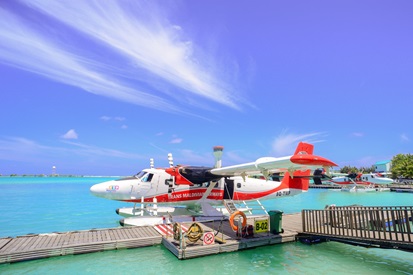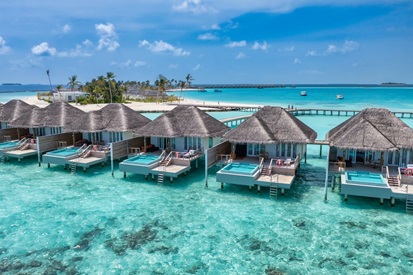

When planning a trip to the Maldives, choosing the right season is crucial based on your preferences, vacation budget, and vision of an ideal holiday.
Are you drawn to serene hours under the sun by the ocean? Interested in diving or snorkeling? Planning excursions? Or perhaps you dream of relaxing in a luxurious room, savoring an exquisite drink to the sound of a tropical rain? This article explores how to minimize surprises and prepare for nature’s whims.

Depositphotos
Climate Features of the Maldives: General Overview
The Maldives, located near the equator in the Indian Ocean, experience a tropical monsoon climate. The archipelago stretches about 750 kilometers from north to south and is completely flat, with the highest point barely reaching 2.4 meters.
These geographical features result in nearly uniform temperatures across different islands at the same time. However, heavy showers can start unexpectedly, even if the sun is shining nearby, a hallmark of the equatorial climate.
Throughout the year, air and water temperatures remain stable, ranging between 24 and 30°C. However, precipitation levels vary significantly by month.

Depositphotos
Equatorial Rhythms: Changing Seasons
The traditional division of the year into four seasons doesn’t apply to the Maldives. Instead, there are two main periods: dry and wet. The dry season runs from December to mid-April, dominated by northeast winds bringing hot weather. From April, the southwest monsoon takes over, ushering in heavy rains and storms. Precipitation peaks in May-June, with the least rainfall in February.

Depositphotos
When to Visit the Maldives: Choosing the Season
In the Maldives, nature sets the rhythm, with everything revolving around the ocean, sun, and wind. Active travelers should take note: diving to explore coral gardens requires crystal-clear water, windsurfing needs steady winds without storms, and seaplane flights or yacht cruises demand calm skies and moderate waves. A jacket may even come in handy, as the wind can be surprisingly sharp.
Dry Season: The most popular tourist period spans November to April, known as “Iruvai,” the winter monsoon season. The sun rarely hides, and the ocean is calm. The Maldives dazzle with clear skies, turquoise waters, and velvety evenings. It’s no surprise that Christmas and New Year attract visitors worldwide, driving prices up significantly.
Interestingly, August, despite not being a weather ideal, sees high demand due to European summer holidays. Rain doesn’t deter tourists from enjoying beach bars or spa rituals.
Wet Season: From May to November, the Maldives enter “Hulhangu,” the summer monsoon season, marked by frequent but brief showers, cloudy skies, and strong winds. Yet, more travelers are discovering the off-season’s charm: fewer crowds, attractive discounts, and a sense that the island is yours alone.

Depositphotos
Maldives Weather by Month: A Brief Overview
Each month has its nuances. Understanding your vacation expectations is key.
January
In January, the Maldives welcome visitors with flawless skies, warm sun, and a calm ocean. Light breezes and rare, short rains (2-3 days a month) create a dream winter. Air temperatures range from 27-30°C, and water from 25-28°C, perfect for swimming, snorkeling, diving, or lounging on a sunbed.
However, high season means high prices, peaking during Christmas and New Year. Early planners can secure ideal weather and deals on luxury villas by the water.

Depositphotos
February
February brings up to 10 hours of sunshine daily, with nearly always clear skies. Rainfall is minimal, and air temperatures hold steady at 28-29°C. As the peak of high season, the islands are bustling.
Lovers flock here to celebrate Valentine’s Day amid turquoise waters and white beaches. By late February, stronger sea breezes and livelier waves offer great opportunities for surfers.

Depositphotos
March
March is another sunny month with rare rainfall. Daytime temperatures reach 30°C, cooling to 27-28°C in the evenings.
April
April marks a seasonal shift. The second half is particularly unpredictable, with sunny days turning cloudy within hours. Expect three to five short but intense showers weekly.
Still, April is worth considering for a Maldives holiday, with fewer crowds and lower prices. If budget is a priority, avoid Easter weekend, when flights and hotels are pricier.
Tip: Plan for early April, especially for divers and snorkelers, as water clarity begins to decline compared to winter.
May
In May, the weather is capricious, with sun, rain, wind, and humid air signaling the start of the southwest monsoon. Showers are sudden but usually brief, often at night. Temperatures hover around 29°C, but high humidity makes the air feel denser.
Waves reduce ocean visibility to 2-3 meters, impacting snorkeling and diving. Heavy rain may disrupt logistics, canceling ferries and requiring private transfers. Mosquitoes appear, though resorts and beaches are treated, and restaurants use aromatic candles. Pack repellents.

Depositphotos
June
Officially, June is the rainiest month, though conditions vary. Divers will appreciate the western atolls, where water is clearer, reefs thrive, and visibility suits snorkeling and diving.
July
July brings more cloudy days, higher waves, and sharper winds, attracting surfers. Check if your hotel offers indoor activities for rainy days, but enjoy the attractive prices.

Depositphotos
August
August features sudden rains that clear quickly, leaving cool air and clear skies. The weather is variable but not harsh, with air at 28°C and slightly lower humidity. Swimming is pleasant even in rain, though underwater visibility drops. The lush greenery and romantic atmosphere shine, but bring a light windbreaker and sunscreen, as the equatorial sun remains strong.
September
September mirrors April’s variability: sunny beaches can turn to brief showers with light winds. Rainfall is frequent but short-lived, rarely disrupting vacations.
If the lagoon seems cloudy, it’s due to wind direction. Move to the other side of the island or a reef-protected lagoon for clear, calm waters.

Depositphotos
October
October is unpredictable, with hot, sunny days and torrential downpours. Air temperatures reach 30°C, and the ocean stays warm. Daylight shortens, but the climate and vibrant nature remain pleasant. Embrace flexible plans to make the weather part of your adventure.
November
In November, clouds often cover the sun, but signs of the approaching dry season emerge between showers. Daytime temperatures are around 28°C, with warm oceans.
Daylight drops to 6 hours, and humidity remains high, but breathing becomes easier. The high tourist season begins, with islands filling despite the weather’s whims.

Depositphotos
December
December marks the start of the true dry season. Early in the month, short rains are possible, but by mid-December, precipitation drops, and sunshine increases. Daytime temperatures reach 30-32°C, with lower humidity.
The ocean remains warm, beaches fill with tourists, and the islands are ready to welcome guests. Prices and demand rise, as December offers near-ideal conditions, especially in the sunny second half, perfect for celebrating New Year under palm trees.

Depositphotos
Maldives Weather for Diving
The Maldives are a dream for underwater enthusiasts. Snorkeling is ideal for beginners, with turtles, tropical fish, majestic rays, and other marine life just meters from shore. Certified divers can explore the underwater universe with instructors.
The best diving period is November to May, with calm, clear waters offering 20-30 meters visibility on the eastern atolls and 15-20 meters on the western side. Summer seas are rougher, with plankton reducing visibility, but windows of clear water exist. Choose the right island side and trust experienced instructors.

Depositphotos
Manta Ray Encounters
Manta rays, with wingspans up to 5 meters, are unforgettable in their natural habitat. Snorkeling in Hanifaru Bay on Baa Atoll, a UNESCO Biosphere Reserve, offers close encounters. Ideal seasons are May to October in the eastern atolls and December to March in the west.

Depositphotos
Weather and Transfers: What to Know
Weather affects not only mood but also travel. Seaplanes operate only in good conditions, so plan transfers with flexibility. Speedboats are more reliable in unstable weather. Rarely, ferries may be canceled. Embrace flexible timing and the island’s unique pace.

Depositphotos
Weather and Tropical Weddings
The Maldives are renowned for honeymoons and romantic beach weddings. Winter offers near-certain sunny ceremonies. Summer weddings are feasible, with resort coordinators handling everything from petals to tents, though these are symbolic, not legally binding.

Depositphotos
Cruises, Fishing, and Surfing
A Maldives cruise is a trip highlight, especially in January when seas are calm and reefs pristine. Summer brings challenging winds and waves.
Fishing from shore is prohibited, but boat rentals yield great catches. The best season for fishing is September to May.
Surfing season runs from March to November, depending on the location.

Depositphotos
Weather and Budget: Finding Balance
Good weather means high season and high prices. In the off-season, hotels offer discounts, bonuses, and room upgrades, like free spa treatments. Plan for 10-14 days to ensure sunny moments despite variable weather.

Depositphotos
Forecasts vs. Reality
Even with extensive research and weather apps, expect surprises. Weather can differ drastically between neighboring islands—one sunny, another rainy. Embrace the journey and let weather be part of the adventure, not the deciding factor.

Depositphotos
More articles
- Indonesia's National Parks: 15 Amazing Reserves
- 17 Temples in Bali You Must See
- Hot Springs in Bali: Which and Where to Visit
- Indonesia's Natural Attractions: 18 Places Worth Seeing
- Meru Betiri National Park in Indonesia
- The Most Interesting Routes in Bali: 12 of the Best
- Mauritius in Winter: Weather and Top Attractions
- Samosir Island in Sumatra: All About Vacationing
- The Maluku Islands in Indonesia: All About Vacations
- 10 Unique Facts About Indonesia



